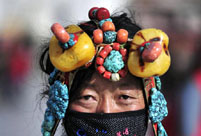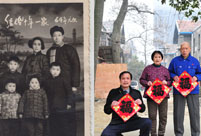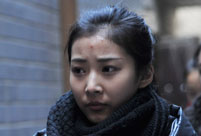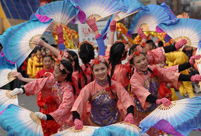 Turnip sculptures amaze tourists in Qingdao
Turnip sculptures amaze tourists in Qingdao Chinese ship formation conducts live fire training in West Pacific
Chinese ship formation conducts live fire training in West Pacific
 China comes in third at figure skating team event
China comes in third at figure skating team event
 China's teenager skater Yan shines at his Olympic debut
China's teenager skater Yan shines at his Olympic debut
 Taiwan-born actor stars on US TV series
Taiwan-born actor stars on US TV series
 Chinese Lunar New Year gift from abroad
Chinese Lunar New Year gift from abroad Chinese champions of Winter Olympic Games
Chinese champions of Winter Olympic Games  Zhang Yimou fined 7.48 mln for over-production
Zhang Yimou fined 7.48 mln for over-production
 Top 10 timeless female Chinese stars
Top 10 timeless female Chinese stars
TOKYO, Feb. 18 -- The U.S. ambassador to Japan avoided an interview with public broadcaster NHK partly due to its president's controversial remarks on wartime sex slavery, Kyodo News reported on Monday.
The U.S. embassy noted its disapproval of the remarks on "comfort women" made by Katsuto Momii, the head of NHK, as a reason for denying the interview request, Kyodo News reported citing "sources close to the decision."
The embassy also expressed its concern about controversial statements made by best-selling author Naoki Hyakuta, also an NHK board member who has described the U.S. air raids on Tokyo during World War II as "genocide" and has denied Japan's responsibility for the 1937 Nanjing Massacre.
NHK's effort to interview U.S. ambassador Caroline Kennedy has not paid off because comments made by Momii and Hyakuta triggered "concerns by the ambassador and Washington that an appearance on NHK would negatively impact the country's image," according to the sources.
Momii made the controversial remarks on Jan. 25 during his first press conference as NHK president, when he told reporters that "comfort women," the euphemistic term for women forcibly recruited to provide sex to Japanese soldiers during World War II, were used in "every country" and that the practice should not be judged by "today's morality."
He then went on to say that the issue was "complicated because South Korea says Japan was the only country that forcibly recruited" women.
Momii later apologized for the remarks, saying they represented his personal opinion.
Momii's remarks were strongly condemned by China and South Korea, who suffered the most during Japan's wartime atrocities.
"His words show that a force in Japan attempting to downplay or even deny Japan's war crimes," Chinese Foreign Ministry spokesman Qin Gang told a daily press briefing on Jan. 27.
Qin said that sexual slavery was a heinous crime committed by the Japanese military during the Second World War, which still harms victims' physical and mental health to this day.
"It is deplorable that the head of Japan's public broadcaster, who should remain fair and impartial, has distorted historical facts and made such a ridiculous claim," a South Korean foreign ministry spokesman said on Jan. 29.
"The thoughtless remark by the NHK chairman clearly illustrates that historical awareness among leading Japanese figures in Abe's Japan has diminished to a dangerous level," the spokesman said.
 Top 10 Chinese youth’s favorite seaside destinations
Top 10 Chinese youth’s favorite seaside destinations Traditional Tibetan clothing tailors
Traditional Tibetan clothing tailors In photos: Unveiling Taishan station
In photos: Unveiling Taishan station Beautiful moments of family reunion
Beautiful moments of family reunion It's not just performing this year
It's not just performing this year 10 Valentine's Day ideas for couples
10 Valentine's Day ideas for couples Let's get married today!
Let's get married today! Highlights of opening ceremony of Sochi 2014 Winter Olympics
Highlights of opening ceremony of Sochi 2014 Winter Olympics Highlights of Chinese New Year celebrations around the world
Highlights of Chinese New Year celebrations around the world  Ruins of Shang Dynasty's structure unearthed in Shaanxi
Ruins of Shang Dynasty's structure unearthed in Shaanxi  Intercity high speed train in operation for the first
Intercity high speed train in operation for the first  Severe coldness freezes large parts of China
Severe coldness freezes large parts of China  Beautiful moments of Sochi
Beautiful moments of Sochi  It's not just performing this year
It's not just performing this year Selfies of "Little colorful flag" girl unveiled
Selfies of "Little colorful flag" girl unveiled Day|Week|Month